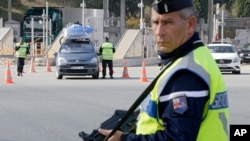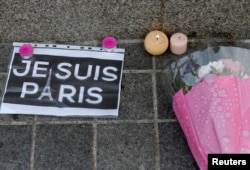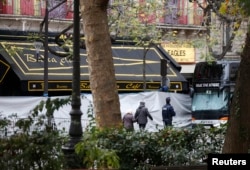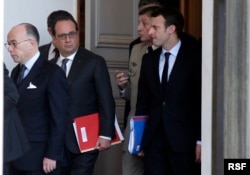Witnesses say the assailants who struck Paris late Friday evening were well-trained and calm and likely rehearsed their coordinated attacks across the French capital, prompting French counterterrorist officials to believe they were veterans of the Syrian civil war or had been trained by experienced jihadists.
French intelligence and counterterror analysts are scrambling to identify the eight assailants and to establish their connections to other militants. They say speed is critical because other attacks may be in the offing, either in France or neighboring European countries.
Speaking on condition of anonymity, a counterterror official told VOA that some of the gunmen have been identified but are not being named at this stage. Police said they found a Syrian passport near the body of one attacker, although fake Syrian passports are often carried by would-be migrants into Europe.
Also needing answers: Were all the attackers French citizens? How did they amass their weaponry and how did they plot their attacks without alerting French security services?
Wariness about more threats
Eight terrorists died in the assaults, according to prosecutor's spokeswoman Agnès Thibault-Lecuivre. She said seven of the attackers detonated suicide vests and an eighth was killed by police. French officials are cautioning that they cannot be sure there are not more extremists waiting to attack.
French officials and survivors describe a slaughter even more chilling and carefully planned than the January assaults on the Paris offices of the satirical magazine Charlie Hebdo and a Jewish grocery.
“We knew they never intended to survive as the attacks unfolded,” the counterterror official, attached to the Paris police, said of the assailants. “They didn’t wear masks, meaning they had no intention of fleeing and remaining unidentified.”
British-Danish psychotherapist Mark Colclough, who witnessed the shooting outside one of several restaurants that came under attack, said the gunman he saw looked "soldierly."
"He was standing in a shooting position," Colclough told Britain’s Guardian newspaper. "He had his right leg forward and he was standing with his left leg back.… Everything he was wearing was tight, either boots or shoes and the trousers were tight, the jumper he was wearing was tight, no zippers or collars. Everything was toned black. If you think of what a combat soldier looks like, that is it…."
He said the gunman’s shooting came in controlled bursts of three or four shots, professional and aimed.
Methodical shooting
At the Bataclan, the concert hall where most of the deaths occurred, fans were listening to American rock band Eagles of Death Metal when the gunfire erupted. Witnesses said the four gunmen who died there also worked methodically as they executed music-goers with barrages of automatic gunfire.
Pierre Janaszak, a radio presenter who attended the concert with his sister and friends, told reporters: "They didn’t stop firing. There was blood everywhere, corpses everywhere. We heard screaming. Everyone was trying to flee."
According to French magazine Le Point, French police have feared since 2011 that the Bataclan theater was on a jihadist hit list because it is Jewish owned. The magazine quoted a member of extremist group Army of Islam, who told French security services three years ago that "we had planned an attack against the Bataclan because its owners are Jews."
French intelligence criticized
After the Charlie Hebdo assaults in January, French intelligence came under scathing criticism for failing to anticipate the attacks, even though the assailants had come under previous surveillance. The scale of Friday’s attacks is likely to prompt more worry that the French security services are hard pressed to cope with the jihadist challenge.
French intelligence officials say they are monitoring more than 5,000 suspected jihadists but don’t have the resources to keep even the top-tier risks under around-the-clock surveillance. They estimate 250 French nationals have returned from fighting in Syria, but admit the number could be higher.
Last summer, U.S. security officials warned that al-Qaida’s affiliate in Yemen appeared to be teaming up with members of a network of al-Qaida veterans within the Syrian affiliate Jabhat al-Nusra – including a Frenchman named David Drugeon – and were planning terror attacks in the West.
French intelligence identified Drugeon, who was killed in a drone strike this summer, as the planner of a 2012 attack on French soldiers and Jewish targets in the southern French city of Toulouse. In the Charlie Hebdo attacks, two of the gunmen were believed to have had training in Somalia and claimed affiliation with al-Qaida. The third, Amedy Coulibaly, claimed allegiance to IS.
Is al-Qaida involved?
Despite the IS claim of responsibility for Friday's attacks, French counterterror officials say fighters aligned with al-Qaida also may have been involved.
"Outside Syria, jihadist networks are overlapping," said a French intelligence analyst. "Those who helped with these attacks inside France may have had an AQ background."
Europe's security services have long feared IS was likely to mount simultaneous and rolling attacks with automatic weapons and suicide bombers in a major European city, copying tactics used in Mumbai in 2008 and elsewhere.
In January, just after the Charlie Hebdo massacre, Belgian counterterrorist units foiled what was described as a jihadist plot when they stormed a house in eastern Belgium, killing two gunmen and wounding a third in a shootout. The gunmen had amassed a huge arsenal of weapons and were thought to be hours away from carrying out a major attack.








